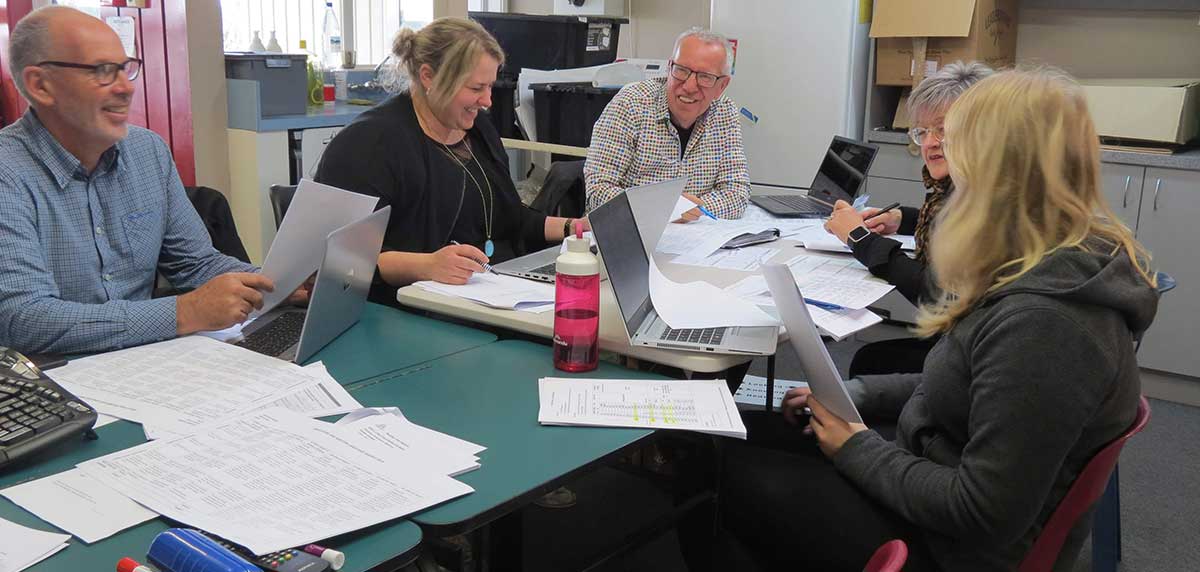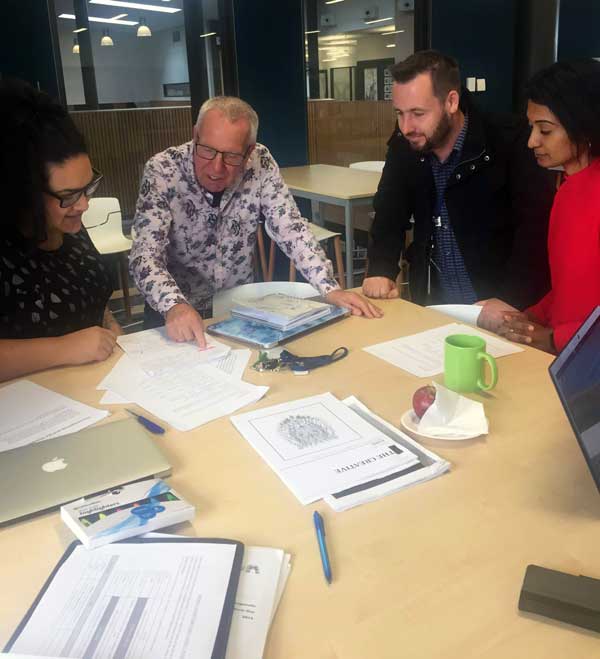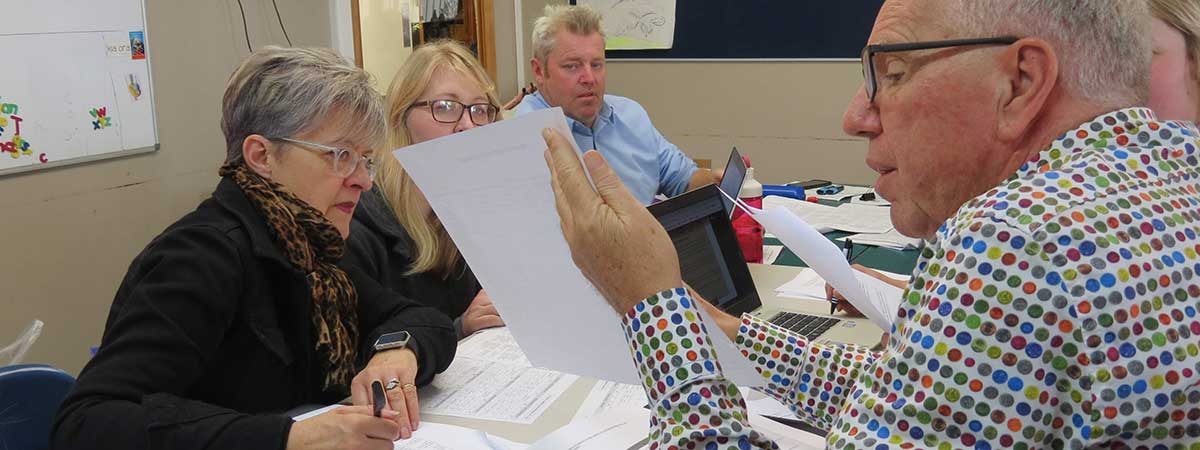
1) Academic / Research Highlights
- Undertaking and completing successfully doctoral studies in education for the University of Auckland (2008-2014), as supervised by Professors Judy Parr and Stuart McNaughton. My thesis explored the topic: ‘What is critical in the effective teaching of writing? A study of the classroom practice of some Year 5 to 8 teachers in the New Zealand context’ (click to view in new window). Subsequent to examination, the thesis earned a place on the Dean’s List for excellence in doctoral studies.
- The examination process generated the following response from the international examiner (Teresa Cremin, Professor of Literacy Education at The Open University/joint coordinator of the British Educational Research association and formerly President of the UK Literacy Association): “The thesis…makes an original contribution to knowledge. It both complements and extends previous work in this area and in particular affords a new sense of depth and detail to the repertoire of pedagogical dimensions and strategies employed by effective teachers….[It] represents a new and valuable study of effective teachers of writing and will I trust find its way into publication with all speed”.
- I have subsequently co-authored a range of articles based on the findings of this doctoral research. Refer to Part Four: Publications for titles of published articles and texts.
- Presentation of the findings at international literacy conferences (most recently the European Literacy Conference, Madrid, 2017), led to an invitation from the US-based editors of The Reading Teacher to write the New Zealand chapter in a to-be-published text on the teaching of writing around the world.
- Acting as a principal investigator (with Professor Judy Parr) on a two-year (2016-2017) research project exploring the instructional actions that make a difference for Year 5 to 8 priority learners (particularly boys, Maori students and Pasifika learners) in writing. Our objective in this project (promoted and funded by the Teaching and Learning Research Initiative) was to work closely with five schools (27 teachers and 450 students) at nuancing the broader findings about effective practice that I had previously made.
- We also undertook a major survey on students’ attitudes to writing and writing instruction and their self-efficacy as developing writers as part of the project.
- Results of the exploration are available on the Teaching and Learning Research Initiative’s ‘research completed’ website (click here to open this document). Results of the survey have been published in the UK journal Literacy.
- I am currently working with a research team from the University of Stockholm’s Special Pedagogical Department at inquiring whether my findings about effective literacy practice in New Zealand might apply also to lifting the engagement and achievement of a group of secondary students with intellectual disabilities in Sweden.
- The initial results have been very exciting and have been accepted for publication in the International Journal of Disabilities, Development and Education.

2) Curriculum Development and Implementation Highlights
- Working directly with schools (including groups of schools) across New Zealand at inquiry projects aimed at lifting the engagement and progress/achievement of students in literacy, particularly writing. Most of my school-based projects are two years in length and involve lifting teacher knowledge (through workshops), demonstrating effective practice to teachers (within their classrooms), holding practice analysis conversations with teachers based on in-depth observations of their practice, analysing student texts for strengths and needs (for formative assessment), working on literacy leadership issues with school leaders, and working with parents/whanau as appropriate.
- Since 2010, I have worked in-depth with an average of 17 primary and intermediate schools per year and in 2019 I am working in-depth with 19 schools (deciles 1-10) across the country.
- Sharing my expertise with approximately 3000 teachers 2010-2019 at day-long presentations/workshops around New Zealand, organised primarily by Learning Network NZ Ltd. (Auckland).
- Leading the team that developed the primary English sections of the New Zealand Government/Ministry of Education’s most recent curriculum for schools (The New Zealand Curriculum) (2007-2008). This led to working with others on the development of the Literacy Learning Progressions (2008-9). These documents collectively set the direction for literacy teaching and learning across New Zealand’s year 1-10 classrooms.
- Writing a commissioned reference book for the Ministry of Education on effective literacy practice for year 5-8 students (2004-2006). This text (Effective Literacy Practice in Years 5 to 8) was launched by the Minister of Education in April 2006 and is now the Ministry’s major text that guides New Zealand’s year 5-8 teachers in their literacy teaching practice.
- Acting as team leader (Auckland) for the Ministry of Education’s Literacy Professional Development Project, as managed by Learning Media (2004-2009). This was a classroom-based programme designed to lift teacher knowledge and capability in reading comprehension and writing. In this position, I also mentored and supported a large group of Auckland literacy facilitators;
- Working closely with the Ministry of Education’s Group Maori as I reviewed and revised their major school-based resources (Te Mana Korero DVDs and accompanying notes) for them. These resources are aimed at helping mainstream schools lift the achievement level of Maori students (2008-2009);
- Heading a major national curriculum development initiative for the Ministry of Education, ie. the English exemplar development project 2001-2003.
- This involved developing, analysing and annotating examples of oral, written and visual language levels 1-5 that now illustrate the standards for the teaching and learning of English in New Zealand primary and junior secondary schools.
- This also involved training 330 literacy advisers, assessment facilitators, College of Education literacy lecturers, resource teachers of literacy and resource teachers of learning and behaviour across the country.
- Acting as co-director and a national literacy facilitator in the government’s Literacy Leadership project for Learning Media (2000-2003). This was a programme designed to lift the capabilities of New Zealand principals and literacy leaders in leading literacy development across their schools.
- This involved developing and promoting the project nationally into year 7/8 schools, undertaking co-responsibility for quality control of the project, working as literacy mentor for principals and literacy leaders in the greater Wellington area and working closely with twenty Wellington schools at literacy initiatives.
- Leading two major Ministry of Education initiatives on transition between contributing, intermediate and secondary schools (2003-4 and 2005-2008). These projects collectively involved eighteen schools and focused on reading and writing across the education sector.
- Delivering keynote addresses and workshops at curriculum conferences (mainly literacy) across New Zealand and in the United Kingdom, United States, Hong Kong, Sweden and Spain (2000-present).
- Serving on a range of literacy and assessment advisory groups and project selection committees for the New Zealand Ministry of Education (including the Ministry’s national literacy reference group and their literacy experts’ group).

3) International Highlights
- Working with post-graduate teachers from the University of Stockholm’s Special Pedagogical Department (2016-2019) at ways of lifting the engagement and achievement of a group of secondary students with intellectual disabilities in Sweden. This principally involved inquiring into whether findings about effective literacy practice developed with mainstream students in New Zealand applied to students with intellectual disabilities in Sweden.
- The work was extended to Finland (Aland and Helsinki) in 2016 and to Norway (University of Lillehammer) in 2018.
- Undertaking literacy development and curriculum delivery projects with school leaders and teachers in a range of elementary and secondary Singapore international schools (December 2012 and January 2019).
- Leading major curriculum development changes in reading and writing for the primary and junior secondary sector Tonga 1999-2003. This involved direct contact with most Tongan schools, through workshops and classroom work, introducing and reinforcing balanced reading and writing programmes and promoting new resource development. This work was well documented for the Tongan Ministry of Education.
- It was evaluated by an internationally renowned literacy evaluator (Professor Warwick Elley) who concluded that “The main comparisons between national surveys of 1999 and 2001 have revealed a substantial improvement in overall literacy standards of Tongan primary schools” and “all indications are that the Tonga Literacy Programme has had a strong beneficial effect on Tongan primary schools”. As a result of this, I have co-authored a paper with Professor Elley (‘Improving English Literacy in Tonga’s Primary Schools’).
- Completing a teacher development project on shared reading with 14 elementary schools in San Diego, California (March-April 2004) for the San Diego Unified School District. This involved working directly with approximately 100 principals, curriculum developers and grade 3-6 teachers on good practices in teaching shared reading.
- Undertaking an exploratory task for the World Bank in Namibia (March-April 2005) on the teaching of reading. This meant observing the teaching of reading in classrooms across the country, interviewing key literacy personnel in Namibia about the teaching of reading and close analysis of all related documents. This led to working with the Namibian Ministry of Education to create develop a long term teacher development plan.
- Leading the training of lead English-language education officials and key teachers on new approaches to literacy teaching, learning and assessment in Hong Kong (September-December 2003). This was commissioned by the Hong Kong Department of Education.
- Leading a review and evaluation for New Zealand Aide on the impact of education-related aide given by the New Zealand government to the Cook Island government (2006-2007).
4) Publications
Gadd, M. (2006). Billy’s story: What’s essential in the teaching of reading and writing? Reading Forum NZ, 33(3), 5-14.
Gadd, M. (2009). Working with reluctant or struggling writers. Reading Forum NZ, 24(3), 5-14.
Gadd, M.O. (2014). What is critical in the effective teaching of writing? A study of some Year 5 to 8 teachers in the New Zealand context. PhD thesis, University of Auckland.
Gadd, M. (2017). What does an effective teacher of writing do that makes a difference to student achievement? SET: Research Information for Teachers, 1, 37-45.
Gadd, M. (2020). Becoming a proficient writer in New Zealand’s primary schools. In J. Lacina & R. Griffith (Eds.), Preparing globally minded literacy teachers: Knowledge, practices and case studies. Chapter 9, 143-162,. New York, NY: Routledge.
Gadd, M., Berthen, D., & Lundgren, L. (2019). Helping students with intellectual disabilities become better writers: An inquiry into writing instruction. International Journal of Disability, Development and Education, doi.org/10.1080/1034912X.2019.1687855.
Gadd, M. & Clueard, T. (2018). Turning non-writers into writers: A case study. Literacy Forum NZ, 33(3), 8-15. [ external link to pdf ]
Gadd, M. & Elley, W. (2003). Improving English literacy in Tonga’s primary schools. In E. Coxon & A. Taufe’ulungaki (Ed’s), Global-local intersections: Researching the delivery of aid to Pacific education (pp.101-117). Auckland: Research Unit of Pacific Education (RUPE).
Gadd, M. & Parr, J.M. (2016). It’s all about Baxter: task orientation in the effective teaching of writing. Literacy, 50(2), 93-99.
Gadd, M. & Parr, J.M. (2017). Practices of effective writing teachers. Reading and Writing, 30(7), 1551-1574.
Gadd, M., Parr, J.M., Robertson, J., Carran, L., Ali, Z., Gendall, L., & Watson, K. (2019). Portrait of the student as a young writer: Some student survey findings about attitudes to writing and self-efficacy as writers. Literacy, 53(4), 226-235; doi.org/10.1111/lit.12178
Parr, J.M., Gadd, M., Carran, L., Robertson, J., Watson, K., Gendall, L., & Ali, Z. (2018). Generating positive outcomes by years 5 to 8 priority learners in writing: An inquiry into effective teacher practice. A report for the Teaching and Learning Research Initiative. Retrieved from http://www.tlri.org.nz (click here to open this document)